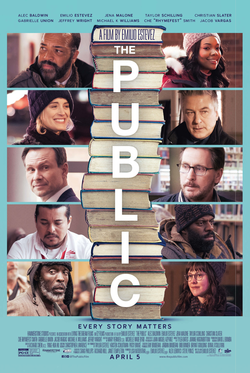
Sexuality/Nudity Mature
Violence Acceptable
Vulgarity Acceptable
Anti-Catholic Philosophy Acceptable
I have been a fan of Emilio Estevez for a long time. His last film, The Way, is a thing of beauty that is insightful and inspiring with its visual beauty and thematic depth. So I was eager to see his follow up, The Public. Once again Estevez aims high to tell a story of importance.
Unfortunately, this movie falls short.
Estevez stars as Stuart Goodson, one of the floor managers at the Cincinnati Public Library in the downtown area. For him, the library is almost hallowed ground. It is a place where ideas can change people's lives. However, most of the people around him do not see that majesty. Mostly, Stuart's job is managing the homeless population who seek shelter in the library during operating hours. The city is experiencing a cold snap and the shelters are pushed to capacity. The homeless patrons led by Jackson (Michael Kenneth Williams) decide to occupy the library at closing and refuse to leave. Stuart has choose: does he stand with the rule of law or the safety of the homeless. That choice defines the rest of the film.
As a director, Estevez is still at the top of his game. He makes us feel the bitter chill of the Cincinnati streets and the warmth, both literal and figurative, of the library. He makes the location a kind of character throughout the film.
He is also fantastic at casting. The cast includes Alec Baldwin, Taylor Schilling, Jena Malone, Gabrielle Union, Jeffrey Wright, and Christian Slater. Wright is a particular standout as an actor who portrays all his characters with a strong sense of truth about them. Even when he gets emotional, I never catch him "acting."
The movie wants to use this cast and this setting to raise important and controversial questions about when morality and legality clash. The set-up is fairly strong and the first act is fairly even-handed in its approach to the problem. But the movie never gets to where it wants to go because of the shortcomings of the script.
In general, I am not a fan of "Christian movies." Though I obviously am receptive to their themes, this films tend to fail artistically. One of the main reasons this happens is that they put message over storytelling. They are so concerned with telling you the moral of the story that they forget to tell the story well. While they have moments of inspiration and uplift, they tend to collapse under their own moral weight because they have not built a solid story structure to support it.
And that is the case with The Public.
There is no place where this is more evident than in the villain played by Christian Slater. The "bad guy" is a district attorney running for mayor of Cincinnati. He cares for nothing instead of his own political ambitions and he sees the library incident as a means to bump his poll numbers. He lies about Stuart and the protest and maligns them maliciously to the media. As in most Christian films, the antagonist is painted in such broad brush strokes as to be cartoonish. The film would have been so much more interesting if they can made it a movie without bad guys: just good people on opposite sides of an important and dangerous confrontation. To his credit, Estevez does not fully idealize the homeless patrons, bringing up their struggles with addiction. And even his allies, like co-worker Myra (Jenna Malone), display shallowness as they strive for depth. But it never feels like a fair moral fight.
The other problem is that the plot doesn't seem to know where it wants to go. The tensions between the two sides build and build to a point. But the resolution to the confrontation is so... odd.
I really can't explain why without spoiling the film. But I got the distinct sense that as the story points came to a head, Estevez tried to come up with a novel solution to the problem. But it is so bizarre that it was much more confusing than cathartic.
Having said all this, like most Christian movies, there are moments of inspiration and uplift. Estevez makes us feel the courage of Stuart grow as the film progresses. The movie moved me to reach out more to the homeless and those in need. Estevez wants very much to get the audience to see the presence of God in the poor. It is clear that he is following the lead of his father, Martin Sheen, and trying to be a good son (or in the case of this movie, "Goodson.").
In The Way, he let us see the slowly unfolding humanity and beauty of four flawed travelers. He did not feel the need to spell out the main morals as he does in The Public, because in that film, he trusted his audience to see it for themselves. If he had done that with this movie, it would have ranked much higher.
However, I would rather have a director that swings for the fences and misses than one that never really tries.


No comments:
Post a Comment